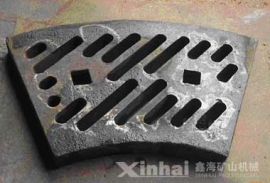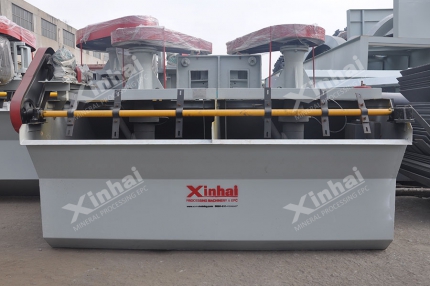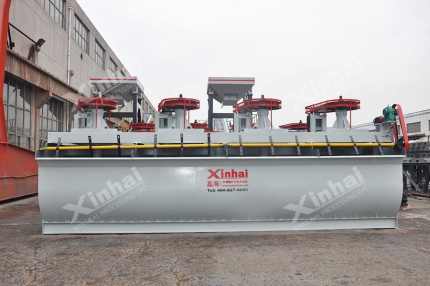Hematite (weakly magnetic mineral) is a common iron ore, which is often extracted by magnetizing roasting magnetic separation, gravity separation, flotation, high-intensity magnetic separation, and combined iron extraction processes. However, some hematite is disseminated with the impurities, which is featured with uneven granularity, large content of fine grains. a small number of gangue minerals, such as magnetite, quartz, and kaolin. At this time, a single hematite mineral beneficiation process or a simple combined hematite mineral beneficiation process cannot achieve better separation indexes, so the more complex combined hematite mineral beneficiation process should be adopted.
At present, this kind of hematite mineral beneficiation process mainly has the following three kinds of processes: continuous grinding - low intensity magnetic separation - high intensity magnetic separation - anionic reverse flotation process, stage grinding-coarse, and fine separation - gravity separation - magnetic separation- anionic reverse flotation process, stage grinding - coarse, and fine separation - magnetic separation – gravity separation - anionic reverse flotation process.

Use the table of contents below to navigate through the guide:
01Low Intensity Magnetic Separation - High Intensity Magnetic Separation - Anionic Reverse Flotation Process
In view of the fine dissemination particle size of hematite, the continuous grinding method is adopted to grind the hematite ore until the monomer separation. After the continuous grinding, the low-intensity magnetic separation and high-intensity magnetic separation are used to remove the primary slime and secondary slime and discharge a large number of tailings, which not only improve the iron grade of the selected iron ore that enters into the anionic reverse flotation process and obtain the high-quality iron concentrate in the anionic reverse flotation stage but also create the good technological conditions for anionic reverse flotation operation after throwing away the primary slime and secondary slime.
This hematite mineral beneficiation process is easy to obtain a better separation index. At present, the high-intensity magnetic operation equipment is the ideal choice of tailings discharging equipment for hematite, and the anionic reverse flotation is the ideal separation operation for hematite mineral beneficiation to obtain the high grade iron concentrate.

02Coarse & Fine Separation - Gravity Separation - Magnetic Separation - Anionic Reverse Flotation Process
The raw ore is sent to the hydrocyclone for classification after the primary grinding, then the coarse hematite and fine hematite are treated respectively. The spiral chute is used to process the coarse hematite, which can obtain the qualified coarse - grained hematite mineral concentrate in time. The low intensity magnetic separation - high intensity magnetic separation - anionic reverse flotation is used to obtain a good separation index and high grade of fine hematite mineral concentrate. The middlings obtained from the gravity separation return to the cyclone for classification operation after the secondary grinding.
In the stage grinding operation, the coarse particles achieve the classification in the first stage grinding, which greatly reduces the amount of ore entering the second stage grinding and reduces the cost. At the same time, it is easy to filter the coarse-grained iron concentrate. In addition, this hematite mineral beneficiation process has a strong separation pertinence. The mineral dissociation is in a random state in the grinding process. Under the condition of coarse grinding, the hematite that has reached the monomer dissociation of minerals should be separated early. Then, adopting the high intensity magnetic separation-anionic reverse flotation to obtain the concentrate and discharge the tailings. The effective combination of coarse-grained and fine-grained processing methods makes the process economical, reasonable, and technologically advanced. At the same time, this hematite mineral beneficiation process has achieved narrow grade beneficiation. The selectability of minerals is not only related to the characteristics of minerals themselves but also related to the specific surface area of mineral particles, the realization of narrow grade beneficiation can largely eliminate the chaos in the flotation process and greatly improve the beneficiation efficiency.

03Coarse & Fine Separation - Magnetic Separation – Gravity Separation - Anionic Reverse Flotation Process
Compared with the Stage grinding-coarse and fine separation-gravity separation-magnetic separation- anionic reverse flotation process, this hematite mineral beneficiation process firstly adopts high intensity magnetic separation for pre-tailings discharging after the coarse particle separation, and then carries out the gravity separation-reverse flotation. The amount of pre-tailings discharging can generally be more than 45%, which greatly reduces the amount of ore selected in subsequent operations and saves the subsequent separation equipment. At the same time, after the pre- tailings discharging by the high intensity magnetic separation, the ore grade entering the subsequent high intensity magnetic separation is high, which is conducive to the gravity separation operation and improves the concentrate grade. However, the relatively coarse lean minerals will also enter the magnetic concentrate, which intensifies the reverse enrichment of the subsequent classifying cyclone and increases the difficulty of reverse flotation operation.

There are the common beneficiation process of this kind of hematite. As mentioned above, this kind of hematite is disseminated with the impurities, which is featured with uneven granularity, large content of fine grains. a small amount of gangue minerals, it is recommended to customize the suitable hematite mineral beneficiation process through the mineral processing test.


 marketing@ytxinhai.com
marketing@ytxinhai.com  0086 13810327080
0086 13810327080 






































































































 CHAT
CHAT MESSAGE
MESSAGE






